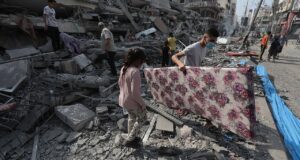Guest contributor: Paul Iddon
13th August 2014
UNESCO presently lists 779 cultural heritage sites in this world of ours. Out of these it deems 27 to be in danger. Unsurprisingly most of these heritage sites are located in the Middle East. Many sites of cultural and religious importance are situated in the polities of Iraq and Syria, both of which are presently enduring frightening instability and strife.
In Syria we have seen the Ancient City of Aleppo being ravaged by artillery and fire. The ancient souk in Aleppo, one of the oldest extant market places in the world was engulfed in a huge blaze which tragically destroyed most of it. With continued clashes between the Syrian regime and Syrian opposition fighters we can unfortunately expect to see more cultural treasures utterly ruined.
Or worse intentionally targeted and destroyed. The past few months have seen to many sites of cultural and religious significance targeted by religious fanatics who perceive them to be heretical.
We saw this coming in early 2001 when during the rule of the Taliban in Afghanistan the Buddhas of Bamiyan statues were intentionally defaced and dynamited. We recently witnessed a similar incident take place in northern Iraq when the Islamic State terrorist militia attacked the Christian community of Mosul, drove it into exile and destroyed and desecrated its cultural heritage sites, most notably the Tomb of Jonah.
The instability in Iraq, due to poor governance in the country, Sunni disenchantment and the Islamic States’ gains in neighbouring Syria compounded to give Islamic State the ability to physically project its disdain for Iraq’s secular society by plundering that Christian community whose roots stretch back as far as two millennia. We shouldn’t hasten to forget that ancient Iraq was Mesopotamia, the Cradle of Civilization and like Syria is home to many common cultural and heritage sites of human civilization. One of the main reasons that sectarians like Islamic State disparage and despise them so much and accordingly seek their destruction.
When countries in which such monuments or sites of cultural importance to the common heritage of humanity are situated find themselves faced with such instability the international community should do its utmost to insure these sites are afforded protection and aren’t exposed to wanton attack by such Islamist terror organizations like the Islamic State and Al Qaeda. Like in Mali when that country was gripped by internal instability in 2012-2013, before France’s intervention, the Al Qaeda affiliate Ansar Dine were able to walk into the wondrous town of Timbuktu and deface and destroy Sufi shrines there.
When religious shrines of importance to Shia Muslims and others come under threat from such groups and are exposed to desecration and destruction one can hardly blame ordinary Shia adherents from seeking to protect their own religious heritage sites when they see destructive threats to their existence. Even though protection of Shia shrines is likely little more than a pretext on the part of the regime in Iran for extending its influence over Shia proxies in Iraq and Syria (both of which are home to Shia shrines which may in the future come under threat of attack by groups like Islamic State) it is nevertheless something many Shia adherents in both Iraq and Iran without any ulterior motives are trying to do. One can hardly blame them when one recalls what happened to the Al-Askari shrine when Al Qaeda terrorists managed to bomb it.
One after all wouldn’t have to be a Christian or a religious person to be dismayed at the sight of somewhere like the Church of the Nativity in the West Bank if it were bombed or shelled. But one also doesn’t wish to see an atmosphere pervade whereby more armed militias are established as a result of pious believers arming themselves and going out solely in order to protect sites of invaluable importance to their religious identity. This again signals the need for a more formidable international order whereby capable nations of the world are able to act under international conventions to guard and protect sites of recognized importance to humanities heritage in places like Iraq and Mali when instability pervades and the threats to the integrity of such sites can be anticipated on the horizon.
A more robust international policy needs to be devised to ensure that when it can nations of the world can operate legally to dispatch troops to protect important sites to ensure that vigilantes will not be able to do what the Taliban have done to Afghanistan’s heritage in the past, what the Islamic State have done to Iraq’s Christian heritage sites and what various groups in Syria will continue to do to many sites of cultural importance situated across Syria. In those areas where international community can feasibly and effectively prevent and forecast harm befalling such sites it has a moral imperative to do its utmost to afford them protection from such heinous terrorist groups.
Paul Iddon is a freelance journalist and writer. His main areas of interest are Middle Eastern affairs, politics and history.
Disclaimer: The views expressed in the article are the sole responsibility of the author and do not necessarily reflect the views of the Human Security Centre.
 Human Security Centre Human Rights and International Security Research
Human Security Centre Human Rights and International Security Research



